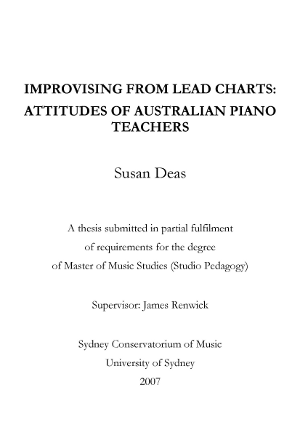Improvising from Lead Charts: Attitudes of Australian piano teachers
A thesis submitted for a Masters in Studio Pedagogy

Why are so many piano teachers not teaching improvisation? What are the barriers? Do teachers not know how to do it themselves? Do they not think it’s important? Do they lack experience, or teaching methods, or resources? What would help them to teach it more?
Written as part of a Masters in Studio Pedagogy at the Sydney Conservatorium of Music, this thesis examined the barriers to teaching improvisation in the piano studio. It surveyed over a hundred piano teachers, and asked them about improvisation: what they could do, what they thought, and what they needed.
The study particularly examined the skill of playing from a lead chart, being able to use the melody and the chord symbols to create a full arrangement with the accompaniment spread across both hands - perhaps the most-used improvisational skill of them all. In fact, the study found that teachers were aware of this: they rated ‘improvisation’ as a general skill as not very important, but the specific skill of playing from a lead chart as much more important. As one teacher said on the survey,
“I think creativity is important, and self-expression. Music is a language. You don’t learn to speak by learning poems off by heart.”
The results showed that teachers in fact had very positive attitudes towards improvisation, but they lacked teaching methods, resources, and above all, lesson time. The study revealed a disconnect between teachers’ priorities for teaching and how they spent time in lessons.
The findings were presented as a paper at the 2009 Australasion Piano Pedagogy Conference. The paper can be found here. If you are interested, you may to request a copy of the complete original thesis.
Abstract
Improvisation has long been an important part of music, but is not always included in piano lessons. This study contends that improvisation from a lead chart, defined here as the ability to take a score notating only melody and chord symbols, and arrange it across both hands for piano, is a particularly important and neglected skill. This study sought to examine the skills, practices and attitudes of Australian piano teachers in order to determine what the barriers are to teaching this skill, and what would help teachers to teach it more.
A questionnaire was given to piano teachers at a Piano Teacher Festival in Sydney, with 119 piano teachers completing a questionnaire (a 65% response rate). Statistical and content analysis were used to evaluate responses. A clear difference was found in responses to the general term ‘improvisation’ versus the more specific functional skill ‘playing from a lead chart,’ suggesting that terminology is an influencing factor.
A total of 59% of teachers were able to play from a lead chart, with 67% working out this skill for themselves rather than being taught by a teacher. The skill was taught ‘sometimes’ by 70% of teachers, but to all or nearly all students by only 9%. Teachers who had the skill were more likely to teach it to their students, and rated it of higher importance. Teachers’ attitudes were very favourable towards the skill, with 85% providing positive written comments about the importance and usefulness of the skill, stating that it had extensive practical applications, helped in the understanding of other areas of music, provided enjoyment and creativity, and might help students to continue playing after lessons stop.
Rather than teachers’ attitudes, this study found that the main barrier to teaching this skill is lack of time in the piano lesson, often because of exam preparation. Teachers cited a need for further training in the skill itself and in teaching strategies, with a need for better resources. This study revealed a disconnect between teachers’ priorities in teaching, which were cultivating a love of music, keeping students playing after lessons stop, and providing a broad music education, compared to the actual time spent in lessons, mainly on technique and traditional repertoire, often in preparation for exams. Problems with parental pressure and exam syllabuses which exclude improvisation are discussed.

